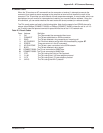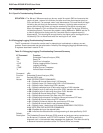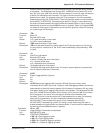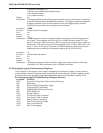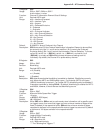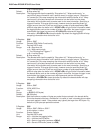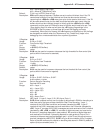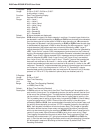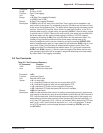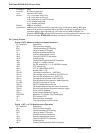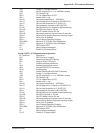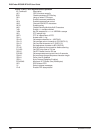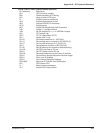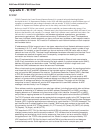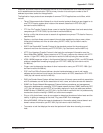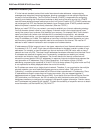
Appendix D - AT Command Summary
RF300E/RF310E 157
S-Register: S105
Usage: S105=n; S105?
Function: Real-Time Logging
Unit: 10ms
Range: n=0 (Real-Time Logging Disabled),
n=1-255 (10ms-2.55s)
Default: 0 (Real-Time Logging Disabled)
Description: If S105 is set to a non-zero value, then Real-Time Logging will be enabled on the
port to which it was given. For autobauding devices, the serial rate will then be fixed
at the rate of the command given. The delay before displaying log information can be
set from 10ms to 2.55 seconds. When there is a great deal of activity in the TA it is
probably best to set for a higher delay, but generally S105=1 (10ms of delay) is good
at a serial rate of 115200. If there is too much activity, then some log information will
be thrown away until the activity allows logging to continue. If DTR is negated
(judged by the setting of &Dn), then log information will also be thrown away. The
number of log information buffers that are thrown away are kept track of by
wNumTracesDenied, which can be viewed by giving the command ATS95?<CR>.
wNumTracesDenied is reset to 0 upon power-up and whenever S105 is set to a non-
zero value. If Real-Time Decoding is enabled and the ports to which Real-Time
Logging and Real-Time Decoding are enabled match (I.E. giving both commands
S104=1 and S105=1 to port 1), then the real-time logging information and the real-
time decoding information will be merged in sequence according to the time-stamp.
By default Real-Time Logging is disabled.
D.5 Test Commands
Table D-6. Test Command Summary
AT Command Function
>LBn Loop-back Control
Unm B-channel Loop-back
Command: >LBn
Function: Loop-back Control
Unit: Decimal ASCII code
Values: n=0—no loop-back,
n=1—loop-back B-channel data, but do not pass data to DTE,
n=2—loop-back B-channel data, but also pass data to DTE,
n=16—loop-back DTE data, but do not pass to B-channel,
n=32—loop-back DTE data and pass to B-channel if available
Default: >LB0 (no loop-back)
Description: >LBn is a test command that can aid in testing various data protocols, performance,
and integrity of the data by using an external tester to send data via the B-channel or
DTE, loop the data back, and the external tester can keep track of the integrity and
performance of various data protocols. When performing B-channel loop-back (n=1,
n=2), then DTE loop-back (n=16, n=32) is not available. When performing DTE loop-
back (n=16, n=32), then B-channel loop-back (n=1, n=2) is not available. To break
out of DTE loop-back, use the escape sequence followed by AT<CR> (such as
+++AT<CR>).



